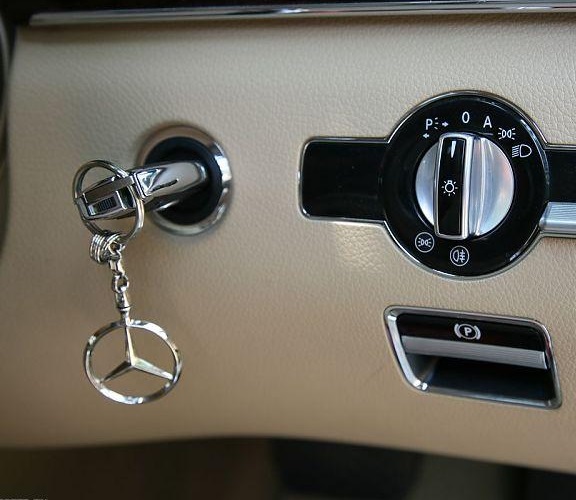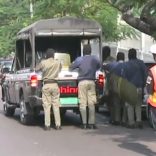Mozambique: Parliament Speaker Talapa visits Russia
Government overhauling laws on top officials’ rights – Mozambique

Mozambican Prime Minister Carlos Agostinho do Rosario on Thursday told the country’s parliament, the Assembly of the Republic, that the government is revising the legislation on the rights and privileges of high ranking state officials.
The revision, he explained, seeks to bring those rights “into line with the current reality of the country, characterised by a challenging economic and financial conjuncture”.
The government, Rosario said, was “implementing measures of budgetary consolidation” intended to make economies that would be used “to finance the priority actions of the government’s five year programme, focusing on health, education, infrastructures and transport”.
Rosario was reacting to an enormous outcry in the Mozambican press and civil society, following revelations that the government is buying 45 luxury vehicles costing around 118 million meticais (just short of two million US dollars).
Ironically, Mozambicans know about these acquisitions through a measure of transparency: the results of tenders must now be published, and the announcements from the vehicle tenders covered the best part of an entire page in the advertising section of Tuesday’s issue of the Maputo daily “Noticias”.
The vehicles are listed in a painfully detailed breakdown – 20 Mercedes-Benz C180 saloon cars, at the unit price of 2.29 million meticais; 10 Ford Rangers (1.978 million meticais each); seven Peugeot 508 (1.385 million meticais each); four Hyundai Accents (1.906 million meticais each); one Mercedes-Benz S500 (11.429 million meticais); one Mercedes-Benz S400 (10.745 million meticais); one Toyota Land Cruiser 200 (10.745 million meticais); and one Ford Wildtrak (2.277 million meticais).
Three of the vehicles were purchased directly, without any tender, while the other 42 were acquired through public tenders.
Justifying the purchases, the permanent secretary of the Ministry of Economy and Finance, Domingos Lambo, told a Maputo press conference on Wednesday that most of these acquisitions were not new. The government was “regularising” vehicles purchased in 2015.
The government had purchased 89 vehicles for high ranking state officials then, at a total cost of 89 million meticais. Lambo said these purchases were made before the sharp depreciation of the metical, and before western donors suspended direct aid to the state budget in response to the scandal of Mozambique’s “hidden debts”.
When the 2015 General State Account was discussed in parliament earlier this year, there was a recommendation from the Administrative Tribunal that the vehicle purchases should be “regularised”, because they did not yet have the stamp of approval from the Tribunal.
So the government set about this “regularisation”, including the publication in “Noticias”.
The other six vehicles were purchased this year, and cost 29 million meticais. Lambo thought this was a sign of “rationalisation”, shown by the fact that there was “only” one Mercedes in this batch.
So, under normal circumstances, could they all be Mercedes, asked one journalist. “Yes, they could!”, replied Lambo.
Lambo did not know who would receive each of the vehicles. The Finance Ministry just bought them, he said, and did not distribute them. The six vehicles bought this year would go to the Office to Assist Former Presidents of the Republic (i.e. Joaquim Chissano and Armando Guebuza) and to Attend to High Ranking State Officials”.
Lambo said the Finance Ministry is well aware of the need to restrict expenditure, but it must also respect the legislation respecting the rights of high ranking officials. “We’re not making a revolution in this country”, he said. “We have to make our management efforts, while respecting what is laid down in law”.
This legalist response is unlikely to calm down the anger over these purchases at a time when there is a desperate shortage of decent public transport.
Rosario assured the Assembly that the government is purchasing more buses and more rail cars to improve urban public transport. “The phased acquisition of 300 new buses is under way and the first 100 should arrive soon, under the memorandum of understanding signed in April between the government and the Mozambican Federation of Road Transport Associations (FEMATRO)”, he said.
In addition, a consignment of 80 new buses from China should arrive shortly, and the government was making efforts to increase the domestic capacity to maintain and repair buses.
Much of the parliamentary debate on Wednesday and Thursday had hinged on whether the government is doing enough to fight corruption, and Rosario insisted that the government is committed to implementing the country’s anti-corruption legislation.
The Plan of Action to reform and develop the public administration “has helped prevent, detect and combat schemes of corruption”, he said.
Success in fighting corruption “requires a change in attitude and behaviour from each Mozambican”, the Prime Minister added. “So we shall continue to train State officials at all levels in matters of ethics and morality, and good practices in managing public assets”.













Leave a Reply
Be the First to Comment!
You must be logged in to post a comment.
You must be logged in to post a comment.